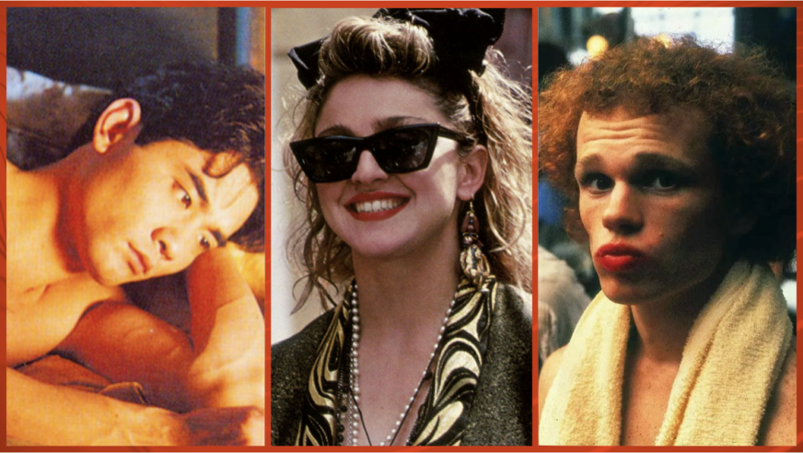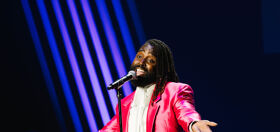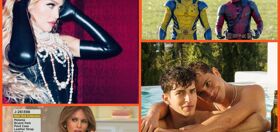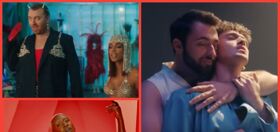
What do the original Material Girl, the Brokeback Mountain director, and the “Flashdance” songstress have in common? They’re all heading to Washington D.C.—well, sort of!
Today, the Library Of Congress has announced that 25 influential movies will be joining the National Film Registry, an archive dedicated preserving titles deemed to be “of cultural, historic or aesthetic importance to preserve the nation’s film heritage.”
Every year since 1988, the organization has selected 25 new films for historic preservation, and this year’s crop includes everything from animated Disney classic Lady And The Tramp to searing history epic 12 Years A Slave to two seasonally appropriate family favorites: Home Alone and The Nightmare Before Christmas.
But, for our purposes, what’s most exciting is the inclusion of three gay (or “gay-adjacent”) classics that have had a major impact on the LGBTQ+ community and beyond: 1980’s generation-defining musical Fame, 1985’s Madonna star vehicle Desperately Seeking Susan, and 1993’s gay Asian-American rom-com The Wedding Banquet.
They’ll be joining other previously selected queer cinema classics like sub-textually gay western Red River, landmark ballroom documentary Paris Is Burning, and John Waters’ subversive throwback Hairspray. In other words, the registry just keep getting gayer and gayer.
In honor of today’s announcement, let’s take a closer look at all three of these newly selected films and consider why they remain and important part of gay culture.
Fame (1980)
Alan Parker’s (Evita) musical chronicles the lives of students at The High School Of Performing Arts in NYC—every high, low, and anxiety-inducing audition—featuring a breakout lead role for the late Irene Cara, whose rendition of the title track made her a star in the music world, too.
The Registry cites both Fame‘s authentic examination of teenagerdom and its over-all influence on movies and music videos in the decades to come—directly inspiring Flashdance, Footloose, and more—as reasons why it’s worthy of preservation in the Library Of Congress.
As if the killer soundtrack and the spotlight on a rising diva wasn’t enough to make it a favorite amongst the gays, Fame also featured a prominent gay character in Montgomery (Paul McCrane). His coming-out story was still a rarity in media of the time, and though viewers have to endure a tough bullying storyline, his heart and talent win everyone over, giving Montgomery a well-deserved happy ending.
Available for digital rental/purchase via Prime Video, AppleTV, Google Play, Vudu, & YouTube TV.
Desperately Seeking Susan (1985)
In this screwball comedy, Madonna stars as the titular Susan, a free-spirited New Yorker whose peculiar personal ads give bored housewife Roberta (Rosanna Arquette) a new lease on life, drawing her into an intoxicating bohemian world.
From filmmaker Susan Seidelman, the film remains an endearing time capsule of a specific time and place. The Library Of Congress writes that the film “shines as a historical snapshot, offering vignettes into parts of New York City that no longer exist, as well as glimpses into ’80s fashion and music, especially Madonna’s personal style and her renowned dance single ‘Into the Groove.'”
And we don’t have to tell you why we love this one: Madge is absolutely fabulous in her first proper screen role, with the film perfectly tapping into her star power and solidifying why she is a capital-I Icon, who both influenced—and was influenced by—the queer community. If only all of her film performances were this good….
Streaming via Paramount+, Hoopla, Tubi, and Pluto TV.
The Wedding Banquet (1993)
Over a decade before his gay cowboy drama Brokeback Mountain made history at the Oscars, Taiwan-born writer-director Ang Lee made a name for himself with this romantic comedy. It’s the story of a gay Taiwanese immigrant (Winston Chao) who marries a Chinese woman (May Chin) to placate his parents and help secure her a green card. But when mom and dad show up in the U.S. to help plan the wedding, hijinks ensue—and he has to hide the truth about his real partner (Mitchell Lichtenstein).
With its matter-of-fact approach to its gay themes, as well as its comical take on cross-generational and cross-cultural relationships, The Wedding Banquet became a critical favorite, both here and abroad. Reflecting on the film’s impact, Lee says: “[I’ve seen] since the movie, whether it’s cross-culture or gay issues, some major breakthroughs, certainly in Taiwan and the Chinese community because the movie was well-liked. It just eased into people’s lives quite naturally.”
For such a gentle, funny, and heartfelt story, it’s hard to overstate just how progressive Lee’s film felt in 1993. Despite the fact that our protagonist wasn’t out to his parents, The Wedding Banquet dared to depict a loving gay relationship on screen—not to mention an interracial one. Even 30 years later, the nuanced and irreverent picture holds up.
Streaming via Amazon Freevee, Hoopla, Kanopy, Tubi, and Pluto TV.
Related:
Ang Lee recalls working with Heath Ledger on ‘Brokeback Mountain’: “[He] knew the character of Ennis deeply”
“Heath’s aura powers the whole story.”


















